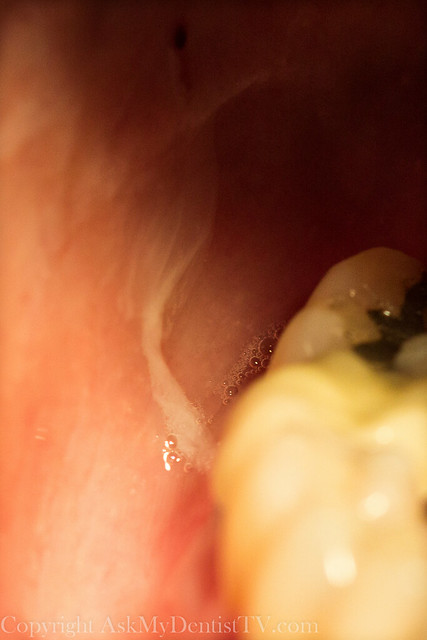The inside of your cheek may be peeling due to habits like cheek biting, consumption of acidic substances, hot foods, or certain toothpastes that may cause a mild allergic reaction. Dry skin conditions like eczema and psoriasis, as well as environmental factors like cold air and fluctuating humidity, can also lead to peeling skin.
To address the issue, try switching to a different toothpaste or oral health care product, ensuring proper hydration, and consulting with a dentist if the problem persists. It's important to note that small localized areas of peeling in the mouth are normal as they heal themselves within a few days.
Peeling skin on the face or inside the mouth can be bothersome and uncomfortable. We will explore the common causes of why the inside of your cheek may be peeling and discuss some potential solutions to alleviate the issue. Whether it's due to habits, skin conditions, or environmental factors, understanding the root cause can help you find the most effective treatment and prevent further discomfort. So, let's dive in and find out why the inside of your cheek may be peeling and how you can stop it.
Causes Of Inside Cheek Peeling
Inside cheek peeling can be caused by various factors such as cheek biting, acidic substances in food and drinks, hot foods, dry skin, eczema, and psoriasis. Toothpaste containing sodium lauryl sulfate (SLS) can also contribute to peeling. Switching toothpaste and maintaining oral hygiene can help alleviate the issue.
Irritation From Habits
One of the most common causes of inside cheek peeling is irritation from certain habits. Habits such as cheek biting and chewing on the inside of your mouth can cause the skin to peel. Additionally, frequently consuming acidic substances in foods and drinks can also lead to irritation and peeling. It's important to be mindful of these habits and try to avoid them to prevent further irritation and peeling.
Dry Skin Conditions
Dry skin conditions, such as xerosis cutis, can also contribute to inside cheek peeling. When the skin becomes excessively dry, it can start to flake and peel off. This can be exacerbated by factors like cold air, hot showers, and fluctuating humidity levels, especially during the winter months. If you have a dry skin condition, it's important to moisturize regularly and take steps to protect your skin from drying out.
Allergic Reaction To Toothpaste
Another possible cause of inside cheek peeling is an allergic reaction to toothpaste. Some people may have a mild allergic reaction to certain toothpastes, especially those that contain whitening agents. If you notice that your mouth starts to peel after using a particular toothpaste, it may be worth trying a different brand or formulation to see if the peeling improves.
Thermal Burns
Thermal burns caused by consuming hot foods or fluids can result in inside cheek peeling. When you consume something hot, the mucosa inside your mouth can be damaged, leading to peeling. Over time, repeated intake of hot foods can even lead to the development of ulcers. It's important to be cautious when consuming hot foods and allow them to cool down before eating to prevent thermal burns and subsequent peeling.

Credit: www.flickr.com
Symptoms And Effects
Peeling inside of the mouth can be caused by various factors such as cheek biting, intake of acidic substances, and hot foods. Other reasons include dry skin conditions like eczema and psoriasis. Switching toothpaste or seeking dental help can alleviate the issue.
Experiencing skin peeling on the inside of your cheek can be quite concerning. Not only can it be uncomfortable, but it may also indicate an underlying issue that needs attention. Understanding the symptoms and effects associated with this condition can help you identify the cause and seek appropriate treatment. Below, we will explore some common symptoms and effects of peeling inside the cheek, including skin peeling on the face, mouth ulcers, and an uncomfortable sensation.
Skin Peeling On Face
One of the common symptoms of peeling inside the cheek is the skin peeling on the face as well. This can be attributed to various factors such as dry skin, eczema, and psoriasis. Cold air, hot showers, and fluctuating humidity can also contribute to skin peeling. It's important to note that if the skin peeling extends to a large portion of your body, it may be a sign of exfoliative dermatitis.
Mouth Ulcers
Peeling inside the cheek often accompanies the development of mouth ulcers. These ulcers can be painful and may impede your ability to eat and speak comfortably. They can arise from habits like cheek biting or the consumption of acidic substances in foods and drinks. Additionally, repeated intake of hot foods or fluids can lead to thermal burns that eventually result in mouth ulcers.
Uncomfortable Sensation
Along with skin peeling and mouth ulcers, peeling inside the cheek may cause an uncomfortable sensation. The peeling skin and ulcers can create a sore and tender feeling, making it difficult to chew or talk without discomfort. This sensation may persist until the underlying cause is addressed and appropriate treatment is administered.
Treatment And Prevention
The peeling inside of your cheek could be caused by a variety of factors such as cheek biting, acidic substances in food and drinks, and even hot foods. It can also be a result of dry or sensitive skin conditions like eczema or psoriasis.
Switching toothpaste may help alleviate the issue.
Switching Toothpaste
If you notice that the inside of your cheek is peeling, the simplest cause may be the toothpaste you are using. Some people may have a mild allergic reaction to certain toothpastes, especially those with whitening agents. To address this issue, consider switching to a different toothpaste that does not contain any potential irritants.
Hydration And Moisturization
Inadequate hydration and moisturization can also contribute to peeling of the inside of the cheek. High concentrations of salt or sugar in the mouth can dry out the delicate oral mucosa, leading to dryness and ultimately peeling. To prevent this, make sure to drink plenty of water throughout the day and use a lip balm or moisturizing gel specifically designed for the lips and inside of the mouth.
Avoiding Irritants
The inside of the cheek can peel due to constant irritation from habits such as cheek biting or chewing hard objects. Acidic substances present in certain foods and drinks can also cause irritation and peeling. To avoid these irritants, try to be mindful of any habits that may be causing damage to the inside of your cheek, and limit your consumption of acidic foods and beverages.
Seeking Professional Help
If the peeling persists despite making changes to your oral hygiene routine and lifestyle habits, it may be time to seek professional help. A dentist can examine your mouth and identify any underlying oral conditions that may be causing the peeling. They can then recommend appropriate treatment options to address the issue and prevent further peeling.

Credit: www.reddit.com
Complications And Signs To Watch For
The inside of your cheek peeling can be caused by various factors such as hot foods, acidic substances, cheek biting, and certain toothpastes. It can also be a result of dry skin conditions like eczema or psoriasis. If you experience persistent peeling, it's best to consult with a dentist or healthcare professional for proper diagnosis and treatment.
Persistent Peeling
If you notice that the inside of your cheek is constantly peeling and the issue doesn't seem to go away after a few days, it may be a cause for concern. Persistent peeling could indicate an underlying problem that requires further attention. In some cases, it could be a sign of a more serious condition, such as oral thrush or lichen planus.
Oral thrush, also known as a yeast infection, can cause the inside of your cheeks to become red, inflamed, and covered in white patches. Peeling may also occur as the infection progresses. Lichen planus is an autoimmune disorder that affects the skin and mucous membranes, including the inside of the cheeks. It can cause the skin to become thin, fragile, and prone to peeling.
If you experience persistent peeling, it is important to consult your dentist or healthcare provider for a proper diagnosis. They will be able to determine the underlying cause and recommend appropriate treatment options.
Severe Pain Or Discomfort
While some mild discomfort may be expected if the inside of your cheek is peeling, severe pain or intense discomfort could be a sign of a more serious issue. If you are experiencing significant pain that makes it difficult to eat, speak, or open your mouth, it is crucial to seek medical attention immediately.
Severe pain or discomfort could indicate a number of conditions, including an oral infection, a dental abscess, or a traumatic injury. These conditions can cause inflammation, swelling, and intense pain in the affected area. If left untreated, they can lead to further complications and may require more invasive treatment.
If you are experiencing severe pain or discomfort along with peeling inside your cheek, do not hesitate to reach out to your dentist or healthcare provider for a thorough evaluation and appropriate treatment.
Unexplained Symptom Patterns
In some cases, peeling inside the cheek may not be the only symptom you are experiencing. It is important to pay attention to any other unexplained symptom patterns that accompany the peeling, as they could provide valuable clues about the underlying issue.
For example, if you notice recurrent mouth sores, persistent bad breath, or a strange taste in your mouth, it could be indicative of a more systemic problem like inflammatory bowel disease or vitamin deficiencies. These conditions can affect the oral mucosa, leading to peeling and other oral symptoms.
Additionally, if you have a compromised immune system due to certain medical conditions or medications, your risk of developing oral infections and mucosal disorders is higher. If you experience frequent peeling inside your cheek along with other recurring symptoms, it is essential to consult your healthcare provider for a comprehensive evaluation.

Credit: www.quora.com
Frequently Asked Questions For Why Is The Inside Of My Cheek Peeling
Is It Normal For The Inside Of Your Cheek To Peel?
Peeling inside the cheek is normal and usually occurs from habits like cheek biting or consuming acidic substances. Hot foods can also cause peeling in the mouth. Switching toothpaste or maintaining proper hydration can help alleviate the problem.
Why My Cheeks Are Peeling?
Cheeks can peel due to dry skin (xeronic cutis), eczema, psoriasis, hot foods, and fluctuating humidity. It can also be caused by using toothpaste with sodium lauryl sulfate or insufficient hydration. Switching toothpaste or increasing water intake may help.
Why Does The Inside Of My Mouth Peel When I Use Toothpaste?
Using certain toothpaste, especially those with whitening properties, may cause a mild allergic reaction and lead to the peeling of the inside of your mouth. To stop this, try switching to a different toothpaste and if the problem persists, consult your dentist for further guidance.
Conclusion
Peeling inside the cheek can be caused by various factors such as cheek biting, hot foods and drinks, acidic substances, and certain toothpaste ingredients like sodium lauryl sulfate (SLS). Dry skin conditions, eczema, and psoriasis can also contribute to peeling skin on the face.
To address this issue, consider switching to a different toothpaste, staying hydrated, and consulting with a dentist if the problem persists. Taking these steps can help alleviate the discomfort and prevent further peeling.






0 Comments